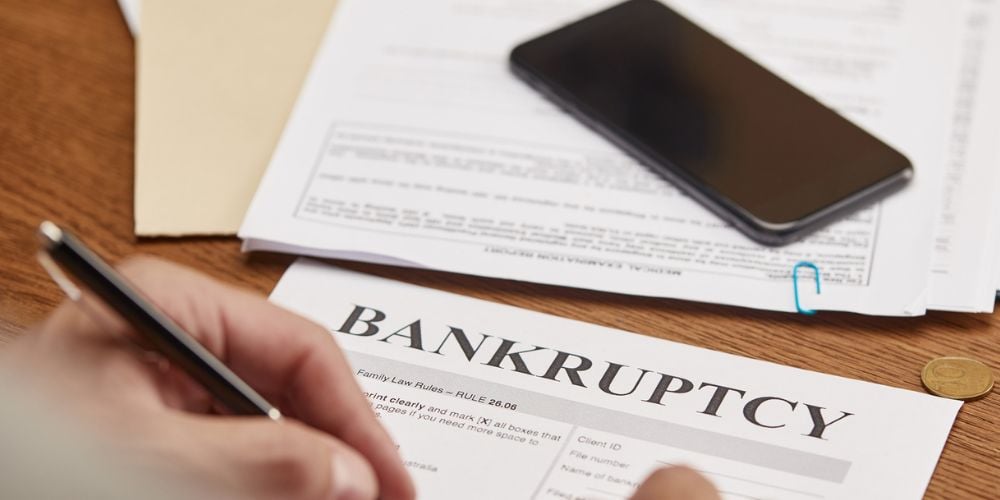For many people, the idea of bankruptcy can be a source of fear and anxiety, and understandably so. Filing for bankruptcy can have a profound impact on your finances, including your credit score.
Something that is often overlooked, however, is the role that bankruptcy can play in the estate of a deceased individual.
In this article, we’ll explore the can an estate file for bankruptcy or not, what it means for beneficiaries or heirs, and what proactive measures can be taken to manage the effects.
Can an Estate File for Bankruptcy?
When an individual passes away, their assets and liabilities pass on to their estate. If the estate is unable to pay off the outstanding debts, it may file for bankruptcy, which is overseen by an estate trustee or administrator.
Bankruptcy may be filed under different chapters, depending on the type of bankruptcy and factors like eligibility, legal options, and consequences for the beneficiaries.
In general, estate bankruptcy may be filed under Chapter 7 or Chapter 11 of the bankruptcy code. Chapter 7 bankruptcy may be chosen if the estate has no means of paying off the debts, or if liquidating the assets is the most viable option.
In such cases, the bankruptcy court will appoint a trustee to oversee the estate’s finances and sell the assets to pay off the debts. Any remaining debts may be discharged after the bankruptcy proceedings are completed.
On the other hand, Chapter 11 bankruptcy is typically filed by businesses or individuals with a high net worth. This option may be selected if the estate is expected to receive income from an ongoing business or if it is unable to liquidate the assets effectively.
Under Chapter 11, the estate trustee or administrator will continue to manage the estate’s finances, and creditors must submit an outline of their claim to the court.

Understanding Estate Bankruptcy
Before we dive into the effects of estate bankruptcy on credit reports, it’s important to understand what estate bankruptcy is and how it differs from personal bankruptcy.
Personal bankruptcy is a legal process that individuals go through to discharge debts they cannot repay. On the other hand, estate bankruptcy occurs when the estate of a deceased individual is unable to satisfy outstanding debts.
This process is overseen by an estate trustee or administrator, who is responsible for managing the deceased’s assets and resolving outstanding debts.
One key difference between personal and estate bankruptcy is the parties involved. In personal bankruptcy, the individual filing for bankruptcy takes on the role of the debtor, while in estate bankruptcy, the estate takes on this role.
Rather than filing for bankruptcy themselves, the estate trustee or administrator takes control of the estate’s assets in order to liquidate them and pay off outstanding debts.
Impact on Credit Report
Bankruptcy can have a significant and long-lasting impact on an individual’s credit score. It can stay on a credit report for up to 10 years, making it difficult to secure credit or loans during this time.
When an estate files for bankruptcy, this can also impact the credit report of the beneficiaries or heirs.
In general, if you are not directly involved in the bankruptcy of an estate, it will not appear on your credit report.
However, if you are a beneficiary or heir of the estate, the bankruptcy may appear on your credit report if you had joint accounts or if the estate’s assets were used to secure loans for which you were a co-signer. In these cases, the bankruptcy may show up on your credit report as a public record, just as it would for a personal bankruptcy.
It’s worth noting that not all debts are dischargeable in bankruptcy, and this can impact a beneficiary’s or an heir’s credit even after the bankruptcy has been resolved.
For example, if a deceased individual had a mortgage on their home, the estate may be able to discharge the remaining balance of the mortgage through bankruptcy.
However, if the beneficiary or heir inherits the home, they may still be responsible for making mortgage payments. If they are unable to do so, this can negatively impact their credit.
Responsibilities of an Estate Trustee/Administrator
The estate trustee or administrator has a number of obligations when it comes to managing the estate and resolving outstanding debts. If the estate is unable to pay off debts, bankruptcy may be one option for satisfying these obligations.
However, the trustee or administrator must ensure that all debts are properly accounted for and that there are no other means available for satisfying these debts.
There are strict rules and regulations governing the management of estates in bankruptcy, and the trustee or administrator must follow these guidelines to ensure that the process is fair and transparent.
They are responsible for notifying all creditors of the bankruptcy, as well as filing reports with the relevant authorities to keep them informed of the estate’s progress.
Potential Consequences for Beneficiaries/Heirs
As mentioned earlier, if you are a beneficiary or heir of an estate that is filing for bankruptcy, you may be affected if you had joint accounts with the deceased or if assets of the estate were used to secure loans that you were a co-signer for.
In these cases, the bankruptcy may appear on your credit report and could make it difficult to secure credit or loans in the future.
Another potential consequence is the impact on inheritances. When an estate files for bankruptcy, the assets of the estate must be liquidated in order to pay off outstanding debts.
This means that beneficiaries or heirs may receive less than they were expecting, or they may not receive anything at all if all of the estate’s assets are used to pay off debts.
To avoid issues like this, it’s important to communicate with the estate trustee or administrator if you have any concerns about your inheritance.
They may be able to provide you with more information about the assets of the estate and how they will be distributed.

Proactive Measures for Credit Management
If you are concerned about the impact that an estate bankruptcy may have on your credit, there are a few proactive steps you can take to manage the situation.
First, it’s important to review your credit report regularly to ensure that any errors or inaccuracies are corrected as soon as possible. You should also consider monitoring your credit score to keep track of any changes that may occur.
If you have joint accounts with the deceased, it may be a good idea to close these accounts and open new ones in your name only. This can help to ensure that the bankruptcy does not impact your credit score.
It’s also a good idea to communicate with your creditors and lenders to keep them informed of the situation and to discuss any options that may be available to you.
Frequently Asked Questions
How long does an estate bankruptcy stay on a credit report?
An estate bankruptcy can stay on a credit report for up to 10 years.
Can estate bankruptcy impact personal credit?
If you are a beneficiary or heir of an estate that files for bankruptcy, the bankruptcy may appear on your credit report if you had joint accounts with the deceased or if assets of the estate were used to secure loans for which you were a co-signer.
Can the estate trustee remove bankruptcy from the credit report?
No, the estate trustee or administrator cannot remove the bankruptcy from a credit report. This is up to the credit reporting agencies to do, and they will only do so if the information on the report is inaccurate.
What actions can beneficiaries take to protect their interests during estate bankruptcy?
Beneficiaries can communicate with the estate trustee or administrator to ensure that they are informed of the situation and that their interests are being protected.
They can also review their credit report regularly to ensure that any inaccuracies are corrected as soon as possible.
Conclusion
In conclusion, estate bankruptcy holds significant implications for both trustees and beneficiaries. Clear communication, proactive credit management, and seeking professional advice are crucial to navigate the process effectively.
Fulfilling obligations, understanding distribution changes, and being aware of potential consequences should be top priorities for trustees.
Beneficiaries need to stay informed, maintain open communication, and seek legal counsel if needed to protect their interests.
Overall, taking proactive measures and seeking expert guidance can lead to a successful and well-managed estate bankruptcy process.


 Tags:
Tags:










